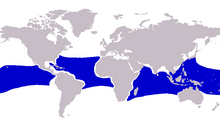阔步鲹
阔步鲹(学名:Caranx lugubris),又称黑鲹、甘仔鱼,为辐鳍鱼纲鲈形目鲈亚目鲹科的其中一个种。
| 阔步鲹 | |
|---|---|

| |
| 科学分类 | |
| 界: | 动物界 Animalia |
| 门: | 脊索动物门 Chordata |
| 纲: | 辐鳍鱼纲 Actinopteri |
| 目: | 鲹形目 Carangiformes |
| 科: | 鲹科 Carangidae |
| 属: | 鲹属 Caranx |
| 种: | 阔步鲹 C. lugubris
|
| 二名法 | |
| Caranx lugubris | |

| |
| 异名 | |
| |
分类及命名
编辑本鱼分类历史非常复杂,该物种首先被误称为Scomber adscensionis(Osbeck,1771),它也被用来描述现在所谓的Pseudocaranx dentex。[2]Georges Cuvier在1833年将该物种描述为Caranx ascensionis。然而,目前已知的物种,首先是古巴动物学家费利佩·波伊在他的两部作品《古巴自然历史古迹》[3]或《古巴岛自然历史》中科学描述的。他将该物种分类至Caranx属,并给出了拉丁语特有的lugubris加词,意思是“悲伤”。[4]虽然描述的基础是来自古巴的一种鱼,但该物种没有任何模式种。Poey最初将他的物种描述为与Cuvier的C. ascensionis不同,然而他后来将C. lugubris和另一个他命名为C. frontalis的物种与C. ascensionis同义。在后来的工作中,Poey再次将这三个名字列为同义词,但将C. lugubris视为有效,并指出Cuvier的名字也被用于Pseudocaranx dentex。大多数后来的分类修订支持Poey的判断。 William Smith-Vaniz和John Randall于1994年向ICZN提出了一项建议,正式将C. lugubris定为物种名称,于1996年被接受。[5]
分布
编辑本鱼广泛分布于全球各大洋之热带及亚热带海域。
深度
编辑水深12至135米。
特征
编辑本鱼体呈椭圆形而侧扁,背侧轮廓比腹侧轮廓更凸,这种凸起在头部最明显,其向下倾斜,使头部轮廓具有棱角的外观。[6]与同属的其他成员相比,嘴巴相当大,上颌骨延伸到鱼眼的中心。[7]上颌包含一系列坚固的外部犬齿,内部带有较小的牙齿,而下颚包含一排宽间隔的锥形牙齿。幼鱼体色较银白,成鱼体成灰黑色,侧腺直走部长度大于弧形部约1/3;胸鳍向后延长,可达臀鳍第十软条上方。第一背鳍有硬棘8枚,第二背鳍有条20至21枚;臀鳍有硬棘2枚,软条约17至19枚。体长可达75公分,体重可达17.9公斤。[8]
生态
编辑本鱼为亚热带或热带海域的凶猛掠食性鱼类,单独或成群活动,幼鱼以鱼类或甲壳类为食。成鱼几乎都以鱼类为食。[9]雄鱼及雌鱼比例为1:0.55,表明雄性几乎是雌性的两倍。[10]雌性为34.6公分,雄性为38.2公分达性成熟,产卵的时间尚不清楚,发生在2月,4月,5月和7月至9月。
经济利用
编辑为具有商业价值的食用鱼,[11]通常用钩钓或围网捕获,通常以生鲜、腌制或晒干贩售,幼鱼美味,成鱼肉甚硬,只能做生鱼片,不过具有雪卡鱼毒的纪录。[12]
参考文献
编辑- ^ 中国科学院动物研究所. 阔步鲹. 《中国动物物种编目数据库》. 中国科学院微生物研究所. [2009-04-16]. (原始内容存档于2016-03-05).
- ^ Smith-Vaniz, W.; Randall, J. Scomber dentex Bloch & Schneider, 1801 (currently Caranx or Pseudocaranx dentex) and Caranx lugubris Poey, [1860] (Osteichthyes, Perciformes): proposed conservation of the specific names. Bulletin of Zoological Nomenclature. 1994, 51 (4): 323–330 [2019-05-08]. ISSN 0007-5167. doi:10.5962/bhl.part.7236. (原始内容存档于2020-11-14).
- ^ Poey, F. Memorias sobra la historia natural de la Isla de Cuba, acompañadas de sumarios Latinos y extractos en Francés 2. Havana. 1860: 97–336.
- ^ Online Etymology Dictionary. lugubrious. 2001 [2009-10-13]. (原始内容存档于2017-07-13).
- ^ International Commission On Zoological Nomenclature. Scomber dentex Bloch and Schneider, 1801 (currently Caranx or Pseudocaranx dentex) and Caranx lugubris Poey, (1860) (Osteichthyes, Perciformes): Specific names conserved. Bulletin of Zoological Nomenclature. 1996, 53 (2): 140–14 [2019-05-08]. ISSN 0007-5167. (原始内容存档于2020-11-14).
- ^ Lin, Pai-Lei; Shao, Kwang-Tsao. A Review of the Carangid Fishes (Family Carangidae) From Taiwan with Descriptions of Four New Records. Zoological Studies. 1999, 38 (1): 33–68. (原始内容存档于2012-02-29).
- ^ Randall, J.E. Caribbean Reef Fishes Third. Hong Kong: T.F.H. Publications, Inc. Ltd. 1996: 368. ISBN 978-0-7938-0117-6.
- ^ International Game Fishing Association. Database of IGFA angling records until 2001 (As made available to FishBase). Black jack, Caranx lugubris. Fort Lauderdale, USA. 2001 [2009-10-14]. (原始内容存档于2020-04-01).
- ^ DeBose, J.L.; Nevitt, G.A. Dimethyl-sulfoniopropionate - A Potential Aggregation Cue for Pelagic Jacks [abs]. Ocean Sciences Meeting Abstracts. 2006, 87 (36): 1.
- ^ Munro, J. L. The Biology, Ecology and Bionomics of the Jacks, Carangidae. Caribbean Coral Reef Fishery Resources (A second edition of The biology, ecology, exploitation, and management of Caribbean reef fishes : scientific report of the ODA/UWI Fisheries Ecology Research Project, 1969-1973, University of the West Indies, Jamaica.). Manila: International Center for Living Aquatic Resources Management. 1983: 82–94 [1974]. ISBN 971-10-2201-X.
- ^ Mead, P. Report on the second visit of the South Pacific Commission Deep Sea Fisheries Development Project to Niue. SPC Report. 1980, 724/80: 1–28.
- ^ Pottier, I.; Vernaux, J.P.; Jones, A.; Lewis, R.J. Analysis of toxin profiles in three different fish species causing ciguatera fish poisoning in Guadeloupe, French West Indies 19 (11): 1034–1042. 2002. doi:10.1080/02652030210155378.
